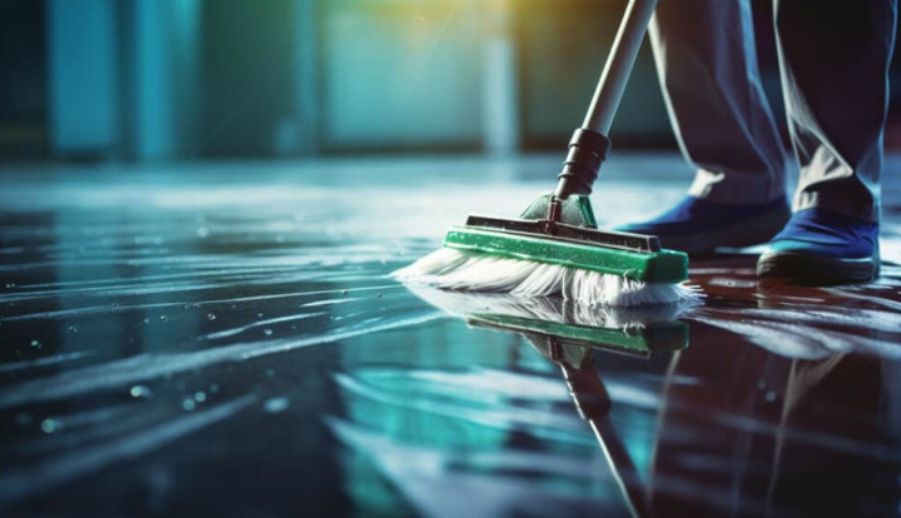Epoxy resin floors have gained immense popularity in both residential and commercial spaces due to their durability and aesthetic appeal.
This article explores what epoxy resin floors are and their benefits, including durability, easy maintenance, water resistance, and chemical resistance.
It also provides practical tips on keeping them clean and well-maintained. Whether you’re considering an epoxy floor for your home or looking to maintain an existing one, you will find insights, cleaning tips, and guidelines to ensure your floors remain stunning and long-lasting.
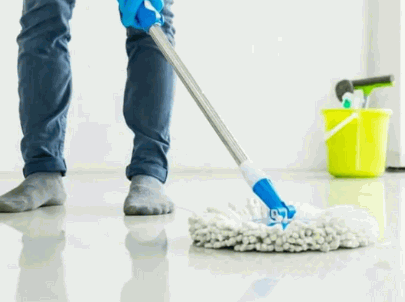
What Are Epoxy Resin Floors?
Epoxy resin floors are a high-performance flooring option, commonly utilized in various spaces such as garages, industrial environments, and commercial centers. This durable floor coating consists of a mixture of resin and hardeners that create a robust surface, ideal for withstanding heavy traffic and wear. Epoxy floors not only provide an aesthetically pleasing finish but also enhance the water resistance and longevity of the underlying concrete surfaces, ensuring they remain intact under challenging conditions. The incorporation of aluminum oxide and anti-slip aggregates in the epoxy mixture offers added traction, making it a safer choice for high-traffic areas.
Explore further: How To Install Resin Kitchen Floor
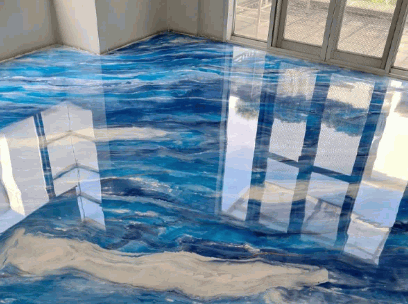
Why Are Epoxy Resin Floors Popular?
Epoxy resin floors have surged in popularity due to their unbeatable durability, aesthetic appeal, and suitability for various environments, including commercial flooring. They are particularly favored in high-traffic areas, such as high-traffic hallways, where traditional flooring may wear down more quickly. The seamless nature of epoxy flooring offers an attractive finish that can be customized in a variety of colors and designs, allowing businesses and homeowners alike to achieve the look they desire.
The remarkable resilience of epoxy resin floors not only withstands heavy impacts but also resists stains and chemicals, making it an ideal choice for industries like manufacturing and healthcare. This flooring solution dramatically reduces maintenance time and costs, as its non-porous surface is easy to clean and maintain.
Its versatility cannot be overstated; whether employed in a bustling restaurant, a trendy retail space, or a cozy home workshop, epoxy provides an attractive, functional foundation.
- Customization options enhance aesthetic appeal.
- Ideal for both residential and commercial usage.
- A long lifespan minimizes replacement frequency.
Due to these factors, more individuals and businesses are embracing epoxy as a practical, stylish flooring solution that meets their enduring needs.
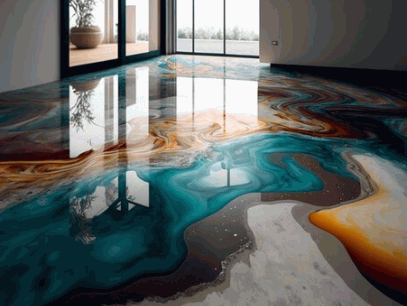
What Are The Benefits Of Epoxy Resin Floors?
The benefits of epoxy resin floors extend far beyond their attractive appearance, encompassing aspects such as durability, low maintenance requirements, and excellent chemical resistance. These floors are designed to withstand heavy foot traffic and exposure to spills, making them an ideal choice for both residential and commercial environments. With their ability to resist dirt and grit, they minimize the need for routine maintenance, ensuring longevity and ease of upkeep compared to other flooring options.
Durability
Durability is one of the standout features of epoxy floors, making them an exceptional choice for commercial flooring in high-traffic areas. Unlike traditional flooring materials, epoxy can withstand heavy loads, resist impacts, and endure exposure to harsh chemicals without degrading. This resilience ensures that epoxy floors maintain their integrity and appearance over an extended period, even in challenging environments.
When discussing the advantages of epoxy flooring, it’s important to note that its durability is not just a superficial trait. These floors are designed to handle various stressors that can diminish the quality of lesser options. For instance, in a busy warehouse or manufacturing plant, where machinery often moves heavy loads, epoxy flooring provides a solid foundation that minimizes wear over time. Its resistance to chemical spills makes it ideal for environments such as:
- Laboratories: where harmful substances could otherwise cause significant damage.
- Food Processing Facilities: that require stringent hygiene standards and frequent cleaning.
- Auto Repair Shops: where oil and other fluids can compromise standard flooring.
This extensive adaptability and resilience make epoxy floors a critical choice for businesses seeking long-term solutions to their flooring needs.
Easy Maintenance
One of the primary advantages of epoxy floors is their easy maintenance, making them a preferred choice for both homeowners and businesses.
This ease of upkeep significantly contributes to their rising popularity, as many opt for surfaces that do not demand excessive labor to remain pristine. Regular cleaning is straightforward, often requiring only a soft dust mop or shop vacuum to remove dirt and grit. For deeper cleaning, a diluted ammonia solution, lactic acid-based cleaner, or professional epoxy cleaners can effectively tackle stubborn stains, ensuring that the floor retains its high-end finish with minimal effort.
To enhance the longevity of these durable surfaces, it is recommended to follow a simple cleaning routine:
- Daily: Wipe down with a damp mop to lift surface dust.
- Weekly: Use a mild detergent with warm water for a thorough clean.
- Monthly: Treat with a specialized floor maintenance product formulated for epoxy surfaces.
By following these cleaning techniques and utilizing the right cleaning solutions, such as Simple Green and non-enzymatic soap, the aesthetic appeal and resilience of epoxy floors can be preserved, contributing to their enduring allure.
Chemical Resistance
Epoxy floors are known for their exceptional chemical resistance, which is particularly advantageous in industrial environments where exposure to various substances is common. This inherent property allows epoxy to withstand spills from oils, solvents, and other harsh chemicals without losing its structural integrity or aesthetic appeal, making it crucial for adhering to safety requirements and maintenance best practices.
Plus its durability, the significant benefit of chemical resistance in epoxy flooring extends to a variety of sectors, including kitchens, laboratories, and manufacturing plants. For instance, in restaurants, where food acids and grease pose constant threats to flooring systems, epoxy’s ability to repel these chemicals ensures cleanliness and longevity. Similarly, in laboratories, the flooring acts as a shield against hazardous spills, safeguarding both the environment and personnel.
Here are some key points on its versatility:
- Oil Resistance: Prevents degradation from petroleum-based products.
- Acid Resistance: Protects against corrosive substances commonly found in chemical manufacturing.
- Solvent Resistance: Maintains integrity when exposed to a variety of cleaning agents.
By choosing epoxy flooring, businesses can not only ensure a safer workspace but also reduce maintenance costs significantly.
Aesthetic Appeal
The aesthetic appeal of epoxy floors is another compelling reason for their popularity, as they can transform any space into a visually appealing environment. Available in a wide array of colors and finishes, epoxy floor coatings can be customized to match specific design preferences, making them suitable for both residential and commercial applications. Whether it’s a sleek, modern look or a more classic finish, epoxy can achieve the desired aesthetic.
This versatility allows for a stunning blend of style and practicality, as epoxy floors can cater to various themes, from industrial chic to contemporary elegance. Some popular options include:
- Metallic finishes create a mesmerizing, reflective surface, adding depth and dimension to the space.
- Color flakes that offer a playful touch, are ideal for garages or recreational areas.
- Terrazzo-like designs that incorporate chips to mimic high-end materials, perfect for upscale environments.
These choices not only enhance the overall aesthetic but also provide durability, ensuring beauty that withstands time and use. In essence, the flexibility in design options makes epoxy an excellent choice for anyone looking to elevate their flooring aesthetics.
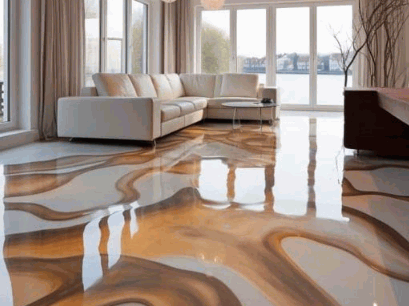
How To Clean Epoxy Resin Floors?
Cleaning epoxy resin floors is a simple and effective process that ensures the longevity and appeal of the flooring. Regular maintenance cleaning is essential to prevent the buildup of dirt and grit, which can dull the surface over time. By following a specific cleaning protocol, homeowners and businesses can keep their epoxy floors looking pristine with minimal effort, using appropriate cleaning products designed for this purpose.
Sweep Or Vacuum The Floor
The first step in cleaning epoxy floors is to thoroughly sweep or vacuum the area to remove loose dirt and grit. This routine maintenance helps prevent scratches and maintains the floor’s smooth surface, which is crucial for preserving its aesthetic appeal and functionality. Using a soft dust mop or a shop vacuum is highly recommended for this initial cleaning phase.
Neglecting this vital step can lead to long-term damage, making it essential to prioritize the removal of such debris as part of an effective cleaning regimen. Employing appropriate tools, such as a mechanical scrub brush or soft bristle push broom, not only enhances efficiency but also safeguards against wear and tear.
Consider using:
- Soft-bristle brooms to gently collect dust without causing scratches.
- High-quality vacuums are designed for hard surfaces, which trap fine particles that brooms might miss.
- Mops are specifically formulated for epoxy floors, which can help in subsequent cleaning steps and manage excessive dirt effectively.
By establishing this routine and utilizing the right methods, maintaining the integrity and appearance of the epoxy surface becomes considerably easier.
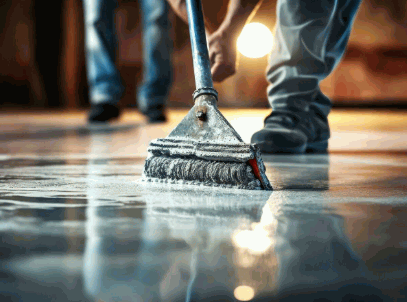
Mop The Floor With Warm Water And Mild Detergent
After sweeping or vacuuming, the next step is to mop the epoxy floor using warm water mixed with a mild detergent. This method is effective for removing any remaining surface stains and dirt, ensuring the floor remains clean without causing damage to the epoxy coating. It’s crucial to use a cleaning solution that is gentle on the surface to maintain its high-end finish.
To begin, gather the necessary supplies: a mop, bucket, and the appropriate cleaning solution. Start by filling the bucket with warm water and adding a few drops of the mild detergent. Be cautious not to use abrasive cleaners or excessive amounts of soap, as this may leave a residue that dulls the gleam of the epoxy surface.
- Dip the mop into the cleaning solution and wring it out thoroughly to avoid leaving excess water on the floor.
- Work in sections, mopping in a figure-eight motion to lift away dirt and create an even shine.
- After mopping an area, it’s beneficial to rinse the mop frequently to avoid spreading dirt back onto the floor.
- Consider using a neutralizing agent after mopping to ensure no residual chemicals remain on the epoxy coating.
Allow the floor to air dry, avoiding the use of harsh chemicals, as this can compromise the integrity of the epoxy. Regular maintenance with this gentle washing method will not only prolong your floor’s lifespan but will also uphold its stunning appearance.
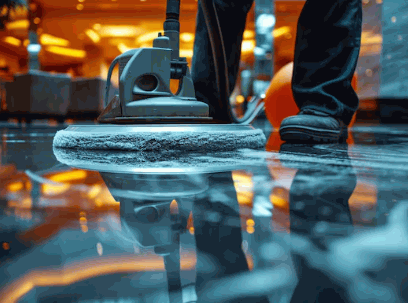
Use A pH Neutral Cleaner For Tough Stains
For tougher stains that are resistant to standard cleaning methods, it’s advisable to use a pH-neutral cleaner specifically designed for epoxy floors. Utilizing a specialized cleaning agent ensures that stubborn stains, such as tire marks or spills from chemical agents, can be effectively removed without compromising the integrity of the epoxy coating.
These cleaners work by maintaining the natural balance of the surface, which is crucial in preserving its shine and durability. To maximize effectiveness, it’s beneficial to follow a few simple tips when using pH-neutral cleaners:
- Application: Apply the cleaner directly to the stain and allow it to sit for a few minutes to penetrate the material.
- Scrubbing: Use a soft-bristle brush or a microfiber cloth to gently scrub the area, avoiding harsh scrubbing that could damage the surface.
- Rinsing: After cleaning, ensure thorough rinsing with clean water to remove any residual cleaner.
This careful approach will not only tackle tough stains but also enhance the longevity and appearance of the epoxy floors, making maintenance much easier in the long run. Products like Simple Green or iKlean Epoxy Cleaner can be particularly effective for deep cleaning without damaging the surface.
Rinse The Floor With Clean Water
Once the floor has been mopped and any tough stains have been treated, it’s essential to rinse the epoxy floor with clean water. This step removes any remaining detergent or cleaning solution, preventing residue from affecting the floor’s finish and ensuring a streak-free shine. Proper rinsing is a critical part of the maintenance cleaning process.
Rinsing the floor not only enhances its appearance but also prolongs its lifespan by protecting the surface from dullness and damage. When residual cleaning agents are left behind, they can attract dirt and grime, making the floor more difficult to keep clean in the future. If the wrong cleaning solutions are used, they may degrade the epoxy finish, leading to costly repairs or replacements.
To ensure an effective rinse, follow these steps:
- Use a clean mop or a floor scrubber with only water.
- Work in sections to avoid puddles and make rinsing more manageable.
- Consider using a pH-neutral rinse to enhance results without damaging the epoxy.
By prioritizing the rinsing process, you’ll maintain the aesthetic and functional integrity of your epoxy floors, reinforcing the importance of diligent cleaning practices.
Dry The Floor With A Soft Cloth OTowel
To complete the cleaning process, it’s important to dry the epoxy floor using a soft cloth or towel. This final step helps to eliminate any moisture left on the surface, which could lead to slippery conditions or watermarks. By ensuring the floor is properly dried, you maintain the clean epoxy finish and enhance the safety of the area.
Utilizing the right drying techniques is crucial in preserving the epoxy surface’s durability and preventing potential hazards. After cleaning, opt for either a high-quality microfiber cloth or a commercial-grade drying tool for effective moisture removal.
Plus soft cloths, consider employing a wet/dry vacuum for larger areas that require quick and efficient drying.
This drying process helps to avoid the buildup of dirt and grime, ensuring a pristine appearance over time.
- Prevents slippery surfaces
- Maintains the shine and luster of the epoxy finish
- Reduces maintenance costs in the long run
- Ensures a thorough deep clean by removing all moisture
Therefore, taking the time to properly dry the floor is not just a minor detail, but an essential part of regular cleaning that contributes significantly to overall safety and aesthetic appeal.
What Should You Avoid When Cleaning Epoxy Resin Floors?
Epoxy floor care requires avoiding certain practices to preserve the integrity and appearance of the surface. Avoiding harsh chemical cleaners that can damage the epoxy coating is crucial, as is steering clear of abrasive cleaning tools that may scratch the surface. Additionally, preventing standing water is essential, as excessive moisture can compromise the floor’s durability and lead to safety hazards. When cleaning epoxy resin floors, certain practices should be avoided to preserve the integrity and appearance of the surface. Avoiding harsh chemical cleaners that can damage the epoxy coating is crucial, as is steering clear of abrasive cleaning tools that may scratch the surface. Additionally, preventing standing water is essential, as excessive moisture can compromise the floor’s durability and lead to safety hazards.

Harsh Chemical Cleaners
Using harsh chemical cleaners on epoxy floors can cause significant damage to the surface, leading to discoloration and degradation of the epoxy coating. Routine maintenance should always prioritize gentle cleaning agents that are safe for use on epoxy surfaces to ensure their longevity and aesthetic appeal.
Many commonly used cleaning products contain ingredients like ammonia, bleach, or phosphates, which can be particularly harmful.
- Ammonia: This chemical can create a cloudy effect on epoxy surfaces and compromise their integrity over time.
- Bleach: While effective at killing germs, bleach can lead to fading and eventual peeling of the epoxy finish.
- Phosphates: Often found in detergents, these can leave harmful residues that interfere with the floor’s protective layer.
- Windex: Commonly used for glass cleaning, but it contains chemicals that can damage the epoxy over time.
Instead, it’s advisable to consider safer alternatives such as pH-neutral cleaners or a simple mixture of vinegar and water. For tougher stains, using specially formulated epoxy floor cleaners, such as CLR or iKlean Epoxy Cleaner, can effectively maintain the shine without risking damage.
Keeping floors clean with gentle solutions will not only preserve their condition but also enhance their visual appeal over time.
Abrasive Cleaning Tools
Abrasive cleaning tools, such as steel wool or rough scrub brushes, should never be used on epoxy floors as they can scratch and damage the surface. Opting for soft cleaning methods is essential for maintaining the floor’s high-end finish and ensuring ease of maintenance moving forward.
These abrasive tools not only compromise the aesthetic appeal of the flooring but can also lead to more significant issues like peeling or flaking, ultimately requiring expensive repairs or refinishing. Therefore, it’s crucial to identify gentle alternatives that keep the floor looking pristine.
Here are some suitable options:
- Microfiber mops or cloths are designed specifically for soft surfaces.
- Soft-bristle brushes that can effectively lift dirt without harming the epoxy finish.
- pH-balanced cleaners that are safe for epoxy surfaces and provide thorough cleaning without abrasiveness.
By choosing these softer cleaning tools, homeowners can ensure that their epoxy floors, whether in a garage or living area, remain attractive and durable for years to come.
Standing Water
Standing water on epoxy floors can lead to a range of cleaning challenges and safety hazards, including slips and falls. It’s crucial to ensure that the floor is properly dried after cleaning to prevent moisture accumulation, which can compromise the epoxy’s durability and effectiveness.
To effectively manage the risks associated with standing water, regular maintenance practices are essential. When cleaning, utilize a wet/dry vacuum to remove excess moisture, ensuring that the surface dries evenly and promptly. This proactive approach helps maintain the integrity of the epoxy finish by eliminating the risks posed by residual moisture. Consider implementing the following strategies:
- Always use mop heads and cleaning cloths designed for quick drying.
- After cleaning, allow proper ventilation by opening windows or using fans.
- Periodically inspect for areas where water may pool and address them directly to avoid future issues.
By taking these steps, one can significantly reduce the risks posed by standing water, making the environment safer and extending the life of the flooring.
How To Maintain Epoxy Resin Floors?
Maintaining epoxy resin floors is essential for preserving their appearance and extending their lifespan, requiring dedicated routine maintenance and care, and using proper cleaning equipment. To keep these floors looking their best, it’s important to implement a structured maintenance protocol that includes regular cleaning, addressing spills promptly, and removing excess dirt. Additionally, scheduling professional maintenance, such as pressure washing, can enhance the overall care of epoxy floors, ensuring they remain in prime condition.
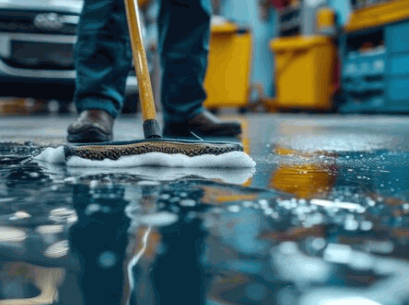
Regularly Sweep Or Vacuum The Floor
Regularly sweeping or vacuuming epoxy floors is a fundamental aspect of maintenance that prevents dirt and grit from accumulating. This simple task not only preserves the appearance of the floor but also minimizes the risk of scratches caused by debris, including rubber tire marks, making it a vital component of effective epoxy floor care.
In addition, routine cleaning contributes to a healthier living environment by reducing allergens and contaminants that can thrive on unkept surfaces. By investing just a few minutes each day, individuals can actively enhance not just the aesthetic quality of their spaces, but also the longevity of their flooring.
- Regular maintenance leads to less frequent deep cleanings.
- It can prevent costly repairs over time.
- Pest problems can also be mitigated with a clean base.
These benefits culminate in an easier, more sustainable approach to housekeeping, ultimately granting peace of mind. Thus, adopting a consistent sweeping or vacuuming routine offers undeniable advantages for those looking to maintain the integrity of their epoxy surfaces.
Clean Spills Immediately
Cleaning spills immediately on epoxy floors is crucial to prevent staining and damage to the surface. Quick action can mitigate cleaning challenges and maintain the high-end finish of the flooring, ensuring it remains visually appealing and functional over time.
The significance of addressing spills without delay cannot be overstated; not only does it safeguard the aesthetics, but it also prolongs the life of the flooring material.
Utilizing the right cleaning products, such as Simple Green, is essential for effective restoration. Here are some recommended products and techniques:
- pH-neutral cleaners: These are safe for epoxy and help avoid any degrading effects on the finish.
- iKlean Epoxy Cleaner: Specifically designed for epoxy surfaces to ensure a perfect finish. Microfiber cloths: Ideal for gently removing spills without scratching the surface.
- Soft-bristled brushes: Helpful for tough stains, while ensuring the floor remains unscathed.
For larger spills, absorbent materials like kitty litter or absorbent pads can be employed to soak up excess liquid before cleaning begins. Products such as CLR and Windex can also be used for spot treatments. Timely intervention not only helps in preserving the aesthetic appeal but also maintains the functional integrity of the floor.
Use Furniture Pads
Using furniture pads under heavy items is an effective way to protect epoxy floors from scratches and dents. This simple maintenance best practice can significantly extend the life of your epoxy flooring, ensuring that it retains its pristine condition even in high-traffic areas.
Properly utilizing furniture pads plays a pivotal role in preserving the aesthetic appeal and integrity of flooring surfaces, especially in homes or commercial spaces where durability is paramount.
By placing these pads underneath furniture such as sofas, chairs, or cabinets, individuals can create a protective barrier that minimizes the risk of damage. To maximize their effectiveness, consider the following:
- Choose the right type of pad: Look for high-quality felt or rubber options that suit your flooring.
- Regularly check and replace worn pads: Inspect them periodically to ensure they are still providing adequate protection.
- Attach pads to all furniture legs: Don’t overlook smaller items like side tables or stools, as they also contribute to overall wear.
Maintaining epoxy floors not only enhances their lifespan but also saves time and costs associated with repairs or replacements.
Schedule Professional Maintenance
Scheduling professional maintenance for epoxy floors can greatly enhance their longevity and performance. Experts can conduct deep cleaning and repairs that regular upkeep may not address, ensuring the flooring remains in excellent condition over time. This proactive approach to maintenance is an investment in the durability and aesthetics of your epoxy floors.
Plus basic cleaning, professionals often offer services such as:
- grout sealing
- surface refinishing
- stain removal
These specialized treatments can prevent damage from spills and wear, significantly enhancing the floor’s appearance while safeguarding its integrity. Regular maintenance checks help identify potential issues early, allowing for timely repairs that can save money in the long run.
By prioritizing expert care, one not only secures the functionality of their floors but also elevates the overall ambiance of the space, making it an attractive and safe environment.

